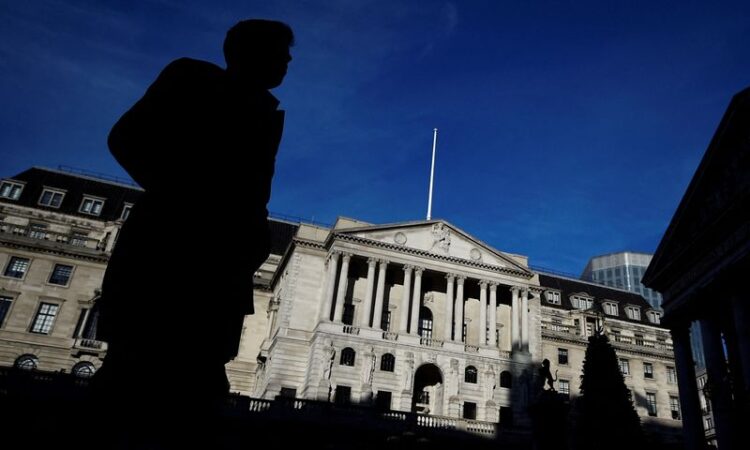
By David Milliken and Andy Bruce
LONDON (Reuters) -Britain chose Clare Lombardelli, the Organisation for Economic Co-operation and Development’s chief economist, to serve as a Bank of England deputy governor, giving the central bank’s interest rate-setting panel a female majority for the first time.
Lombardelli will start a five-year term at the BoE on July 1, succeeding Ben Broadbent as deputy governor for monetary policy, the government said in a statement on Thursday.
“Clare brings significant experience to the role tackling financial and economic issues both domestically and internationally,” finance minister Jeremy Hunt said.
Lombardelli’s recent comments suggest she may be unlikely to embrace the prospect of interest rate cuts at the BoE, at least in the short term while inflation remains stubbornly high.
“Central banks are right not to loosen too quickly and to keep a restrictive stance until they are more confident that inflation is going to make it to those targets,” Lombardelli told CNBC earlier this month.
The finance ministry said Lombardelli would lead the response to recommendations expected next month from former Federal Reserve chair Ben Bernanke to improve the BoE’s forecasting process, as well as overseeing monetary policy.
The BoE has four deputy governors, responsible for monetary policy, financial stability, markets and banking, and financial regulation respectively.
Lombardelli joined the OECD from Britain’s finance ministry in May 2023, having spent the previous five years as the finance ministry’s chief economist. She started at the finance ministry in 2005 after beginning her career at the BoE.
Simon French, chief economist at investment bank Panmure Gordon, said Lombardelli was early to warn about inflation risks as Britain recovered from the COVID pandemic in 2021, at a time when many economists expected higher inflation to be transitory.
“She is relatively hawkish on that spectrum,” he said, adding that this might bleed into how the central bank’s economic forecasts are presented.
“At the margin – and it is only at the margin – it raises the hurdle or the burden of proof (for a rate cut).”
Financial markets expect a first rate cut by the BoE in August, at what will be Lombardelli’s first meeting, where she will be in charge of producing new inflation forecasts.
BRITAIN ON DIVERSITY PATH
Lombardelli’s appointment means five of the nine Monetary Policy Committee members will be female, the first female majority since its inception in 1997.
By contrast, the European Central Bank has only two women on its 24-member Governing Council although one of them is President Christine Lagarde.
Britain might also have its first female finance minister later this year – Rachel Reeves is the top finance spokesperson for the opposition Labour Party which is running far ahead of the ruling Conservatives in opinion polls.
“It helps with the Bank of England and the MPC’s long-standing female diversity problem,” French said, though he added that the MPC was open to criticism on other metrics, including the high proportion of former Treasury officials in its ranks.
Lombardelli’s appointment continues the recent pattern of senior roles at the BoE – which has been operationally independent of the government since 1997 – frequently being filled by former finance ministry officials.
Deputy governors Dave Ramsden – whom Lombardelli replaced at the finance ministry as chief economist – and Sam Woods are also ex-Treasury officials, as was former deputy governor Jon Cunliffe whose term expired last year. Broadbent also served at the Treasury early in his career.
Last year the head of the National Institute of Economic and Social Research think tank, Jagjit Chadha, said there was a perception that the BoE had been “taken over” by Treasury officials since the financial crisis.
The finance ministry oversees the appointment process for the BoE’s governor, deputy governors and most MPC members.
Lombardelli previously served as an economic advisor to David Cameron when he was prime minister and was then-finance minister George Osborne’s principal private secretary.
Before that, she was seconded to the International Monetary Fund where she was part of a team based in the Greek finance ministry to monitor bailout terms during 2010 and 2011.
(Additional reporting by Muvija M; writing by Andy Bruce and David Milliken; editing by William Schomberg and Elaine Hardcastle)





